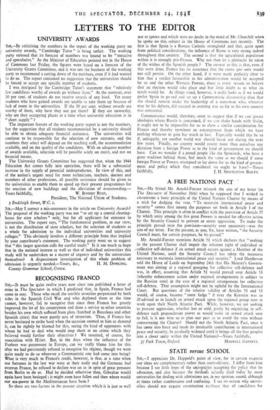RECOGNISING FRANCO
Sm,—It must be quite twelve years now since you published a letter of mine in The Spectator in which I predicted that, in Spain, Franco had come to stay. Those who recall the terrible atrocities perpetrated by both sides in the Spanish Civil War and who deplored them at the time cannot, however, fail to recognise that since then Franco has greatly improved the lot of his countrymen and done a service to other countries besides his own which suffered from plots (hatched in Barcelona and other Spanish cities) that were purely acts of terrorism. Thus, if Franco has never hesitated to strike hard when the occasion seemed to him to demand it, can he rightly be blamed for this, seeing the kind of opponents with whom he had to deal who would stop short at no crime which they believed would further their objectives ? We resented, of course, his association with Hitler. lint, in the days when the influence of the Fuehrer was paramount in Europe, can we really blame him for this after we had persistently refused to recognise his regime, though we were quite ready to do so wherever a Communistic one had come into being? What is very much to Franco's credit, however, is that, at a time when our fortunes in the last war were at their nadir and the Germans had overrun France, he refused to declare war on us in spite of great pressure from Berlin to do so. Had he decided otherwise then, Gibraltar would again have been besieged ; it might even have fallen and then where would our sea-power in the Mediterranean have been ?
So there are two factors in the present situation which it is just as well not to ignore and which were no doubt in the mind of Mr. Churchill when be spoke on this subject in the House of Commons just recently. The first is that Spain is a Roman Catholic stronghold and that, quite apart from political considerations, the influence of Rome is very strong indeed throughout that country. The second is that the agricultural population within it is strongly pro-Franco. Why not then let a plebiscite be taken of the wishes of the Spanish people ? The answer to this is that, even if this were done, Franco has no assurance that the status quo ante would not still persist. On the other hand, if it were made perfectly clear to him that a verdict favourable to his administration would be accepted by us and the other Western Powers, there is every reason to believe that an election would take place and but little doubt as to what its result would be. As things stand, however, it really looks as if we would prefer Spain to go red and set up a Communistic dictatorship than that she should remain under the leadership of a statesman who, whatever may be his defects, did succeed in averting war so far as his own country was concerned.
Commonsense would, therefore, seem to suggest that if we can ignore ideologies where Russia is concerned, if we can shake hands with Stalin, it ought not to be impossible for us to show a similar consideration for Franco and thereby terminate an estrangement from which we have nothing whatever to gain but much to lose. Especially would this be to if, unhappily, yet another world war should break out during the next few years. Finally, no country would resent more than ourselves any dictation from a foreign Power as to the kind of government we should have. Can we wonder if a proud people like the Spaniards, who have a great tradition behind them, feel much the same as we should if some foreign Power or Powers attempted to lay down for us the kind of govern- ment and policy which they considered we ought to have?—Yours


































 Previous page
Previous page